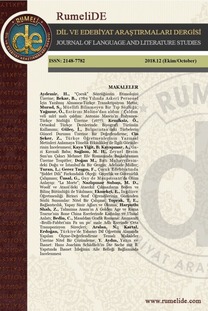Semi-modal verb “Need to” and the modality of obligation “Must & Have to” in authentic corpus-based English
Derlem temelli İngilizce’de yarım kip yapısı “Need to” (-meli/-malı) ve zorunluluk kipleri “Must & Have to” (-mek zorunda)
___
Biber, D. (2004). Modal use across registers and time. In Curzan, Anne and Kimberly Emmons (Eds.), Studies in the history of the English language II. Berlin/New York: Mouton de Gruyter.Biber, D., Johansson, S., Leech, G., Conrad, S., & Finegan, E. (1999). The Longman grammar of spoken and written English. London: Longman.
Biber, D., Johansson, S., Leech, G., Conrad, S., & Finegan, E. (2006). Longman grammar of spoken and written English. Harlow: Longman.
Biewer, C. (2009). Modals and semi-modals of obligation and necessity in South Pacific Englishes. Anglistik, 20, 41-55.
Collins, P. (2005). The modals and quasi-modals of obligation and necessity in Australian English and other Englishes. English World-Wide, 26, 249-73.
Collins, P. (2009). Modals and quasi-modals in English. Amsterdam: Rodopi.
Diaconu, G. (2011). The expression of obligation and necessity in New Englishes – A corpus-based study. PhD Dissertation, Freiburg University.
Foley, M., & Hall, D. (2003). Advanced learners’ grammar: A self-study reference & practice book with answers. Harlow: Longman.
Kastrone, I. (2008). Need to and the modality of obligation: A corpus-based approach. Unpublished Master’s Thesis. University of Oslo, Oslo, Norway.
Leech, G. (2003). Modality on the move: the English modal auxiliaries 1961-1992. In R. Facchinetti, M. Krug & F. Palmer (Eds). Modality in contemporary English. (pp. 223-240). Berlin/New York: Mouton de Gruyter.
Leech, G., Hundt, M., Mair, C., & Smith, N. (2009). Change in contemporary English: A grammatical study. Cambridge: Cambridge University Press.
Mair, C. (2006). Twentieth-century English. history, variation and standardization. Cambridge: CUP.
Mair, C., & Leech, G. (2006). Current change in English syntax. In B. Aarts, & A. MacMahon (Eds.), The handbook of English linguistics (pp. 318-342). Oxford: Blackwell.
Millar, N. (2009). Modal verbs in TIME - frequency changes 1923-2006. International Journal of Corpus Linguistics, 14(2), 191-220.
Nokkonen, S. (2006). The semantic variation of need to in four recent British English corpora. International Journal of Corpus Linguistics, 11(1), 29-71.
Seggewiß (published as Müller), F. (2008). From degrammaticalisation to regrammaticalisation? Current changes in the use of NEED. Arbeiten aus Anglistik und Amerikanistik, 33(1), 71-94.
Seggewiß, F. (2012). Current changes in English modals: A corpus-based analysis of present-day spoken English. Freiburg: Albert-Ludwigs-Universität Freiburg dissertation.
Smith, N. (2003). Changes in the modals and semi-modals of strong obligation and epistemic necessity in recent British English. In R. Facchinetti, M. Krug & F. Palmer (Eds). Modality in contemporary English. (pp. 241-266). Berlin/New York: Mouton de Gruyter.
Swan, M. (2002). Practical English usage: International student’s edition. Oxford: Oxford University Press.
Tagliamonte, S., & D’Arcy, A. (2007). The modals of obligation/ necessity in Canadian perspective. English World Wide, 28(1), 47-78.
Tottie, G. (2002). An introduction to American English, 156-157. Oxford: Blackwell.
Quirk, R., Greenbaum, S., Leech, G., & Svartvik, J. (1985). A comprehensive grammar of the English language. London: Longman.
- ISSN: 2148-7782
- Yayın Aralığı: 6
- Başlangıç: 2014
- Yayıncı: Yakup YILMAZ
Çeviride temsiliyet ve yazarın tercih ettiği metin
Tuva Türkçesinde “yansıma söz + de-, kıl- (kın- ve kılın-)” yapısı
Sürgünde Vals: Kenizé Mourad’ın Saraydan Sürgüne adlı romanında sürgün ve kadın
Simla Ayşe DOĞANGÜN, Hacer Esra ALMAS
Hüsn ü Aşk’ta anlam çeşitliliği yönünden kuşlar
Özlem GÜNEŞ, Ayşe YEŞİL, Nurseda ÖĞRETEN
Bir memorat örneği olarak Cinânî’nin cinleri
Modern İran edebiyatından metinlerarasılık örneği: Hüzünlü Bahar
Dar mekânda geniş zamanlar: Sabahattin Ali’nin anlatılarında (öykülerinde) mahpushane izleri
